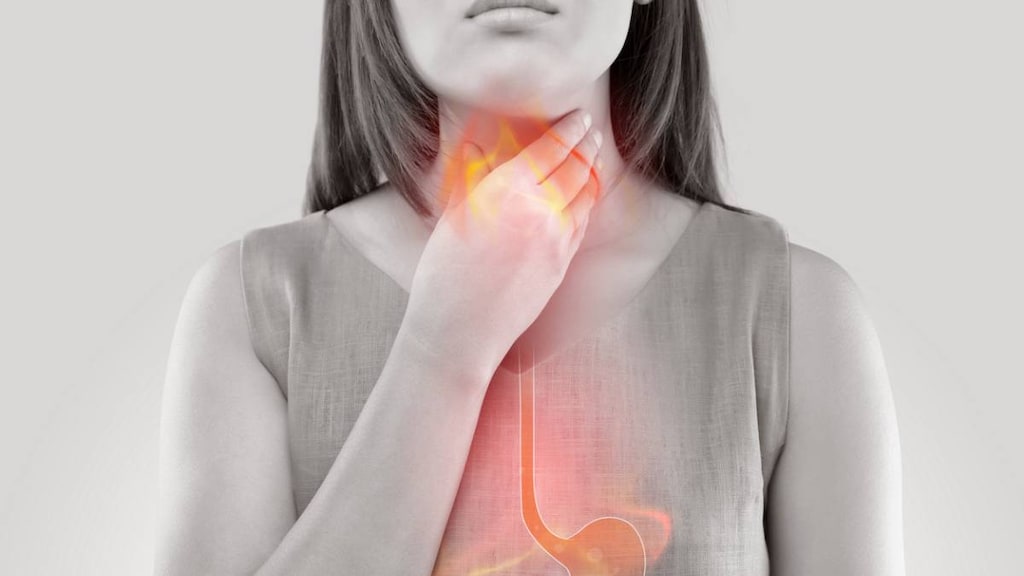
What is GERD (Gastroesophageal Reflux Disease)?
Gastroesophageal Reflux Disease (GERD) is a digestive condition caused by a weak lower esophageal sphincter that allows the backflow of stomach contents up the esophagus.
The contents backflowing up the esophagus may be either acidic or non-acidic. Acidic contents are more likely to cause symptoms than nonacidic contents.
Gastroesophageal Reflux Disease may also be called GERD, reflux, or heartburn.
What causes GERD (Gastroesophageal Reflux Disease)?
Our digestive system is supposed to be a one-way street. Food enters our stomach where it is broken down so that nutrients can be absorbed before being excreted out via the intestines and colon.
Guarding the entrance to our stomach is a ring of muscle fibers called the lower esophageal sphincter (LES). The LES prevents swallowed food from moving back up the esophagus and normally remains tightly closed.... until we swallow. People with GERD have a weakened LES that allows partly digested stomach contents to leak back up the esophagus - causing symptoms.
GERD is more likely to develop in people who:
- Are overweight
- Drink alcohol
- Smoke
- Are pregnant
- Have certain medical conditions such as scleroderma or an hiatal hernia
- Take medications such as corticosteroids, NSAIDs (eg, ibuprofen, diclofenac), or methotrexate.
How is GERD (Gastroesophageal Reflux Disease) diagnosed?
Your doctor will ask you questions about your symptoms and how long you have had them. They will perform a physical examination and ask about any medications you take and what other medical conditions you have. Further tests, such as an upper endoscopy, an ambulatory acid (pH) probe test, an esophageal manometry, or an x-ray of your digestive symptoms, may also be performed.
Some other worrying conditions can mimic symptoms of heartburn or GERD. Always see a doctor if this is the first time you have had symptoms or if they have changed in any way. Other symptoms that are a cause for concern when they happen in conjunction with GERD symptoms include coughing spells; difficulty swallowing; blood specks after you cough, vomit, or in your bowel movements; or unexplained weight loss.
Other important reasons to see your doctor straight away if you have symptoms of GERD include:
- A family history of gastric cancer in the past
- Previous stomach ulcers
- Taking medications such as NSAIDs (such as aspirin, ibuprofen, naproxen, diclofenac), corticosteroids (eg, prednisone), or iron tablets
- Discovering a lump in your stomach.
What are the symptoms of GERD (Gastroesophageal Reflux Disease)?
Heartburn is a common symptom of GERD that is usually felt as a burning pain rising up from the stomach to the esophagus.
Other symptoms may include:
- A feeling that food is stuck behind your breastbone or feeling like there is a lump in your throat
- Chest pain
- Nausea after eating food.
Other not-so-common symptoms include:
- Bringing food back up (regurgitation)
- Coughing or wheezing
- Difficulty swallowing
- Hiccups
- Hoarseness or a noticeable change in your voice
- A sore throat.
GERD symptoms tend to be worse at night or after bending over, lying down or eating a big meal. Symptoms that persist all day need to be checked by a doctor.
It is important to realize that symptoms of a heart attack or angina can also mimic symptoms of heartburn or GERD. Even experienced doctors can't always tell the difference.
Heart attack symptoms may include sudden crushing pain in the chest; pain that is felt in the back, neck, jaw, stomach, or arm (especially the left side); sweating; lightheadedness; nausea; chest tightness during physical or emotional stress; or shortness of breath. In some people, particularly women, heart attack symptoms can be subtle.
Always seek medical attention if you are not sure. There is no one symptom that distinguishes a heart attack from GERD or vice versa.
How is GERD (Gastroesophageal Reflux Disease) treated?
Treatment of GERD depends on the severity and may include:
- Lifestyle changes, such as weight loss, stopping smoking, reducing alcohol intake, avoiding clothes that are too tight, reducing the size of your meals and avoiding acidic or spicy foods
- Avoiding NSAIDs, such as aspirin and ibuprofen, and not taking medicines just before bed. Always try to remain upright for at least 15 minutes after taking any medication
- Antacids
- H2 blockers
- Proton pump inhibitors
- Surgery.


